#Husna
Text
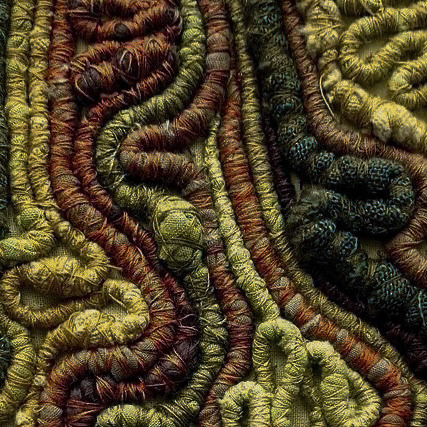

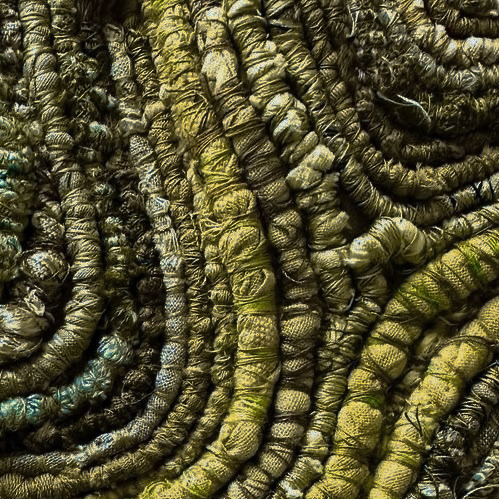



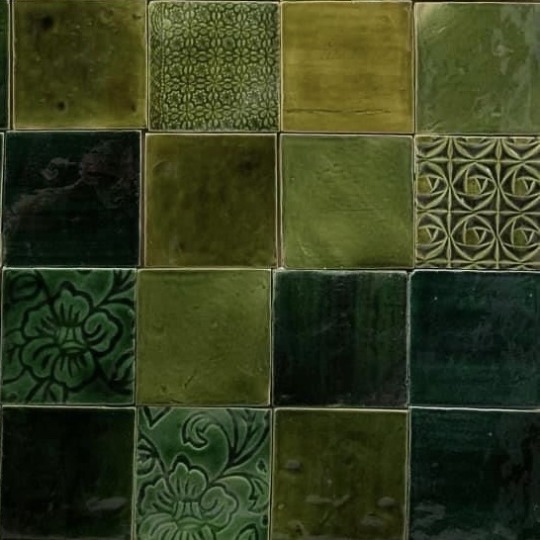

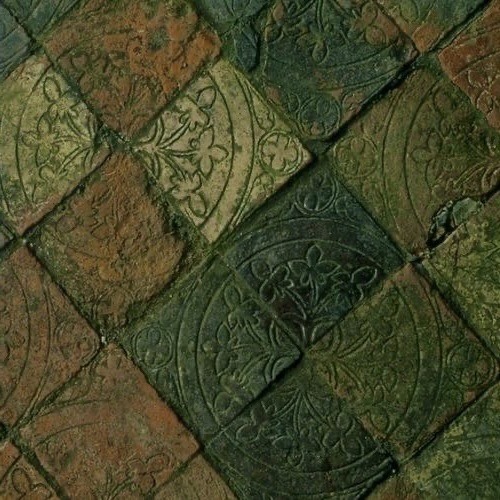
𝓜𝓸𝓸𝓭𝓫𝓸𝓪𝓻𝓭 𝓯𝓸𝓻 𝓽𝓱𝓮 𝓷𝓪𝓶𝓮 𝓗𝓾𝓼𝓷𝓪 ♠️🌿
𝓡𝓮𝓺𝓾𝓮𝓼𝓽𝓮𝓭 𝓫𝔂: @rainforestroom
#i really hope you like it#name moodboard#Husna#order number 3 is up!#earthcore#naturecore#fantasy aesthetic#light aesthetic#rainforest#forestcore#cottage academia#green moodboard#December
139 notes
·
View notes
Text

youtube
My husband was from Pakistan. He passed away 15 years ago just after 15 months of marriage. Due to some difficult family issues I was not able to attend his funeral. He left me with a 40 days old baby at that time and endless loving memories. When I hear this song I feel like flying to Pakistan where he is buried and just lie on his grave till death overcomes me as well. The lyrics shatter my heart to fragment and crush my soul to pieces. Sometimes the pain is too much for my chest to contain and I feel I will just explode. But it never happens. I reassemble my weeping heart and soul and keep going with a smile.
I wonder how many pain and sorrow are hidden behind a beautiful smile. I wonder how many tragedies people carry in their lifeline. I wonder what keep us going on and on.
Aur rota hai raaton mein Pakistan kya waise jaise Hindustan
o Husna
Husna (Coke Studio) – Lyrics and Translation | Treasured Trifles and Trifled Treasures (wordpress.com)
#love#oneness#smile#pain#sorrow#truth#wisdom#lizard#husna#meri#pakistan#maharashtra#another#beach#india#hindustan
5 notes
·
View notes
Photo

"Mistari II" by Husna Ismail on INPRNT
148 notes
·
View notes
Text

Allah calls Himself Al-Mutakabbir— The Supremely Great, The Perfection of Greatness— on one occasion in the Quran. He is the One who is supremely great. Al-Mutakabbir reveals His Greatness and power at every moment and in every incident!
The Supreme, The Possessor of All Rights, The Perfect Greatness
Mutakabbir comes from the root kaaf-baa-raa, which has three main meanings. The first main meaning is to be great in size, rank, or dignity, and the second to to be great in age and in learning. The third main meaning to have rights, privileges, and attributes that others don’t have.
This root appears 161 times in the Quran in 18 derived forms. Examples of these forms are kabura (“hard”), yastakbiroona (“arrogant”), akbaru (“(is)greater”), and al-kibari (“the old age”).
Linguistically, kibriya means greatness and sovereignty, and it encompasses the meanings of the perfection of one’s self and existence; nobody can be described as such except Allah. Allahu Akbar– Allah is the Greatest— comes from the same root, as well as the name of Allah, Al-Kabeer. Al-Mutakabbir is the One who possesses all greatness, who is above having any of the qualities of His creatures, who cannot be harmed by the oppressors among His creation, and whose greatness and pride are the utmost.
Al-Mutakabbir Himself says: He is Allah , other than whom there is no deity, the Sovereign, the Pure, the Perfection, the Bestower of Faith, the Overseer, the Exalted in Might, the Compeller, the Superior. Exalted is Allah above whatever they associate with Him. [Quran, 59:23]
Allah Al-Mutakabbir versus the arrogant
Allah ‘azza wa jall describes people as mutakabbireen (arrogant) on multiple occasions in the Quran. They have arrogance in their hearts and actions towards Allah by disbelieving in His signs and they are arrogant to other people by looking down on them due to position, race, wealth, etc. The Prophet salallahu ‘alayhi wa sallam said: Allah is beautiful and loves beauty, arrogance is: rejecting the truth and looking down on people. [Muslim, At-Tirmidhee] Only Allah is al-Mutakabbir in a positive sense.
A lesson on how to battle pride
What is the opposite of kibr (arrogance)? It is humility, the adornment of a believer. Abu Hurayrah radiyallaahu ‘anhu narrated that the Prophet salallaahu ‘alayhi wa sallam said: . . . and no one will exercise humility for Allah’s sake, except that Allah will raise him up [Muslim] Urwah ibn Zubair radiyallaahu ‘anhu said: I saw Umar carrying a large leather water canteen on his shoulder. I said to him, ‘O Amir-ul-Mu’mineen, you shouldn’t be carrying that’. Umar replied by saying, A delegation came to Medina and I saw their obedience to me, and some ‘nakwah’ entered into my heart and I wanted to destroy it.
We all know of the strong personality of Umar radiyallaahu ‘anhu and yet when a small amount of pride (nakwah) entered into his heart, he hurried in an attempt to destroy it before it destroyed him.
How Can You Live by This Name?
1. Be great by being humble.
O you who believe, whoever of you should revert from his religion, Allah will bring forth a people He will love, and who will love Him, (who are) humble towards the believers, and powerful against the disbelievers . . . [Quran, 5:54] The greatest strength that you can attain is to have true reliance upon Allah ‘azza wa jall and to seek His support in hardship and ease. The highest level of greatness you can attain is to show humility (tawaada) to your Lord. Those who are well grounded in knowledge say: ‘We believe in it; it is all from our Lord.’ None will take heed except the people of understanding [Quran, 3:7]. Don’t only follow the ayaat or ahadeeth that suit you, but strive to apply the whole message to your daily life and dealings.
2. Respect others for the sake of Allah.
O you who have believed, let not a people ridicule [another] people; perhaps they may be better than them; nor let women ridicule [other] women; perhaps they may be better than them. [Quran, 49:11] Your knowledge of others is only by perception. Don’t mock or insult others as they might have a higher position with Al-Mutakabbir than yourself! Respect others, even though they may possess less beauty, knowledge, wealth, fame, or status or have a different skin colour. The Prophet salallaahu ‘alayhi wa sallam said: Whoever possesses an atom’s weight of kibr will not enter into the paradise [Muslim]. Abu Bakr radiyallaahu ‘anhu said: Let not any Muslim belittle another Muslim, for the lowest of the Muslims is great in the Sight of Allah.
3. Battle arrogance.
Allah ‘azza wa jall is the only true king and you are His slave— let’s not forget this. It’s easy to fall into arrogance (takabbur), thinking you know better and transgressing the limits set by Allah al-Mutakabbir. So keep checking your heart for feelings of arrogance creeping in and deal with them straight away by reminding yourself of the greatness of Allah. Al-Hasan al-Basri said: I wonder at the son of Adam! He uses his hand to wash himself from his waste once or twice a day, yet he seeks to compete with the All-Mighty? Don’t get carried away with your wealth or achievements, know it is from Al-Mutakabbir and not from yourself. The way to avoid arrogance is to remember Allah as much as we can until it becomes a habit to instantly thank Him for any good that comes our way, so increase in saying alhamdulillah!
4. Be humble to increase your knowledge
Abdullah ibn Mu’tazz radiyallahu ‘anhu said: The humble student is the one who gets the most knowledge, just as the lowest places on earth collect the most water. So always be humble towards your teachers and invoke Allah for them.
5. Ask al-Mutakabbir.
Every day ask Allah al-Mutakabbir to save you and protect you from the evil of pride and arrogance.
O Allah, Al-Mutakabbir, we know that You are supremely Great. Guide our hearts and actions to humility towards You, our Deen and Your creation. Protect us from arrogance and assist us to ways to cure any arrogance that entered our hearts. Make us of those who are blessed to witness Your Grandeur in Paradise, ameen!
#allah#islam#revert help team#asma al husna#revert help#muslim#ayat#daily#allah’s name#dua#pray#prayer#salah#muslimah#hijab#religion#reminder#mohammed#new revert#new convert#new muslim#how to convert islam#converthelp#convert islam#become a muslim#welcome to islam#daily ayat#prophet#god#revert
20 notes
·
View notes
Text

The Most Loving, The Infinitely Affectionate, The Beloved
80 notes
·
View notes
Text
So subtle is His kindness towards us, that we are unable to perceive it.
–Syeikh Ali Hammuda
Pagi kemarin, saya di pertemukan lagi dalam agenda sharing kecil bersama Mbak Nenny dan Shofie. Kami lanjut membahas salah satu Asmaul Husna, berangkat dari buku Li Annakallah karangan Ali bin Jabir Al-Faifi.
Teringat, waktu kecil, ada sebuah buku anak di rumah saya, yang masih terbekas jelas memori ini atas sampul warna hijaunya: Buku tentang 99 Nama-Nama Allah.
Tapi di weekly sharing yang Alhamdulillah sudah tiga pertemuan ini, ada yang berbeda rasanya.
Ntah mengapa, setelah 23 tahun digempur dengan jatuh-bangun kehidupan, diperkenalkan kembali dengan 99 Nama-Nya, membuat saya lebih bisa merasa rendah hati (baca: menyadari bahwa se-begitu butuhnya manusia dengan Rabb-Nya).
Ya, rendah hati.
Karena untuk bisa kembali mencoba mengenal Nama-Nama Ini saja, yang rasanya seharusnya sudah sedari dulu harusnya saya hapal, butuh kerendahan hati. Butuh mengosongkan bejana hati kembali, bahwa masih banyak lo Han, yang belum kamu tau tentang Allah :".
Ya Allah, kemana saja saya selama ini?
Dan di pertemuan itu, kami sampai di Nama Allah:
Al-Lathiif, Yang Maha Lembut.
Dari kata Al Luthf, cara atau perilaku yang tersembunyi dan detail. Dengan secara tersembunyi, tertutup, dari arah yang tidak kita ketahui, dari arah yang tidak diduga.
Ketika ada sesuatu yang terjadi pada kita, Allah Yang Maha Lembut, tak langsung memberi tahu kita tentang takdir kita.
Kita mikir kalau mau hasilnya A, harus B dulu. Padahal bisa aja pake C dulu, baru ke D, baru ke A.
Seperti ketika Nabi Yusuf 'alaihissalam mengalami berbagai kejadian yang menggoyahkan jiwa dan iman.
Dari terjebak di sumur, hingga bisa menjadi orang yang disegani di Mesir. Rasanya gak mungkin. Gak ketebak. Bahkan ketika ditakdirkan harus masuk penjara atas ketidakbersalahannya pun, Nabi Yusuf gak langsung dikeluarkan.
But Allah is So Subtle, that all of those trials finally made it to His beautiful decree: berjumpanya Nabi Yusuf dengan takwil mimpinya.
Bersujudnya matahari, bulan, 11 bintang kepadanya. He finally reunited with his family.
Seperti ketika Nabi Musa 'alaihissalam yang dibuang ke sungai, dirawat Fir'aun,
Allah menyelamatkan Nabi Musa gak dengan cara langsung. Betapa sedihnya sang Ibu ketika harus menghanyutkan Nabi Musa ke sungai. Bagaimana mungkin bisa kembali?
Tapi Maha Lembutnya Allah, membuat Nabi Musa gak mau minum ASI dari wanita lain, hingga akhirnya kembali ke pangkuan sang Ibu.
Seperti ketika Allah mengeluarkan Rasulullah shalallahu 'alaihi wa salam dan para sahabat dari siksaan pemboikotan Syi'ib Bani Hasyim.
Tiga tahun diboikot terisolir. Tidak boleh ada yang berbicara, berteman, berdagang, dengan Bani Hasyim, kecuali jika secara sukarela mereka menyerahkan Sang Nabi untuk dibunuh.
Bagaimana bisa pemboikotan ini dihentikan?
Hingga lima pemuda akhirnya menemukan satu sama lain untuk bersepakat menggagalkan piagam pemboikotan. Dan ternyata ketika dibuka piagam itu, rayap memang sudah menggerogoti piagam kejahatan itu, kecuali pada tulisan-tulisan Nama Allah.
Bahkan seperti ketika kami sedang sharing pagi itu,
Gak sengaja ngepas Mbak Nenny memutuskan akhirnya bahas Al Lathif, padahal awalnya gak mau bahas itu.
Dan kebetulan ngepas daku baru baca kisah pemboikotan yang dihadapi para sahabat Nabi.
Dan ngepas malam sebelumnya baru aja overthinking tentang takdir-Nya.
Atau hingga tulisan ini hadir di hadapan sang pembaca.
Semua tiba-tiba, tanpa kita sadari, membawa kita pada takdir menemukan dan merasakan makna Nama Al Lathiif ini 🥀.
Kadang kita mikir, apa yang terjadi ke kita itu hal yang biasa. Padahal Allah menjadikan sesuatu dengan sebab-sebabnya. Hanya saja kita tidak sadar.
Karena saking lembutnya Allah. 🥺
Begitu pula tentang Mimpi.
Kadang, kita punya impian, cita-cita yang besar tapi merasa pesimis dengan diri sendiri. Maka yang harus kita ingat adalah, kita punya Allah.
Jangan lupa, bahwa Allah Maha Lembut. Kita gak tau sebab kecil mana yang mengantarkan kita pada impian kita tersebut.
Maka sejatinya, setiap kita melihat semua takdir kita, pasti ada kelembutan. Maka Amatilah.
Semoga, kita akan selalu bisa mendapati kelembutan-kelembutan dari Allah Yang Al Lathiif.🥀
– Senin, 6 Mei 2024
(ditulis pukul 7.00 pagi)
9 notes
·
View notes
Text
You may think something is good for you, when actually it is bad for you, and you may think something is bad for you when actually, it is good for you. Allah knows and you don't know. So put your trust in the zaat which is Al-Aleem, The All Knowing. For He is the best of planners.
#allah#muslim#islamicreminders#deen#dawah#deenoverdunya#islamification#tawakkal#quraan#quranic#asmaul husna#allahuakbar#subhanallah
11 notes
·
View notes
Text
Insight Asmaul Husna Al- Jabbar #1
💔 Hatimu terluka & lagi putus asa? Bismillah, semoga ini jawabannya 👇🏼
Ar-Rahman & Ar-Rahim mungkin adalah dua Asmaul Husna yang sering kita denger. Kalau Al-Jabbar, sering juga nggak?
Setidaknya, Al-Jabbar itu punya 3 makna:
Menjaga dari patah
Menarik sesuatu kepada arah yang baik
Yang lebih tinggi daripada yang lain
Kita bayangin dulu tentang patah tulang.
Biasanya kalau patah tulang, bagian tangan yang patah bakal dikasih gips untuk membatasi ruang gerak tangan yang patah. 🩹
Kebayang nggak, betapa sakitnya tangan kita kalau patah tapi gak dikasih gips? Ngilu banget pasti. 😖
Nah, gips yang dipake buat orang yang patah tulang dalam bahasa Arab disebut جابرة (jabirah), dekat dengan kata الجبار (al-jabar).
Terus, apa hubungannya Al-Jabar sama Jabirah?
Jabirah berfungsi untuk menyembuhkan tulang yang patah.
Al-Jabbar adalah penguat untuk mereka yang terpatahkan.
Sebagaimana tulang yang patah dan gak pake gips/jabirah yang bikin semakin parah lukanya, maka hati yang terluka jika tidak dibersamai dengan Allah Al-Jabbar, maka tak terbayang bagaimana rusaknya, sakitnya, perihnya. 😭
So that, dalam duduk di antara 2 sujud, kita meminta kepada Allah,
واجْبُر��نِي ..
"Wajburni.."
Seakan-akan kita minta kepada Allah dengan kalimat,
"Yaa Allah, dengan Nama-Mu Al-Jabbar. Sembuhkan patah hati yang hamba alami, Ya Allah. Maafkan hamba telah berharap kepada selain Engkau, Ya Allah. Tolong sembuhkan luka ini karena jika bukan kepada Engkau hamba minta kesembuhan, kepada siapa lagi hamba harus memohon." 🥺
Al-Jabbar adalah Asmaul Husna yang Allah sediakan bagi hamba-Nya yang sedang terluka.
Kalau lagi merasa terpatahkan harapannya, coba doa pake Asmaul Husna yang ini.
3 notes
·
View notes
Text
[Book Review] Hearts That Remember
Score: 4.65/5.00
***
20:4
تَنزِيلًۭا مِّمَّنْ خَلَقَ ٱلْأَرْضَ وَٱلسَّمَـٰوَٰتِ ٱلْعُلَى ٤
˹It is˺ a revelation from the One Who created the earth and the high heavens—
— Dr. Mustafa Khattab, The Clear Quran
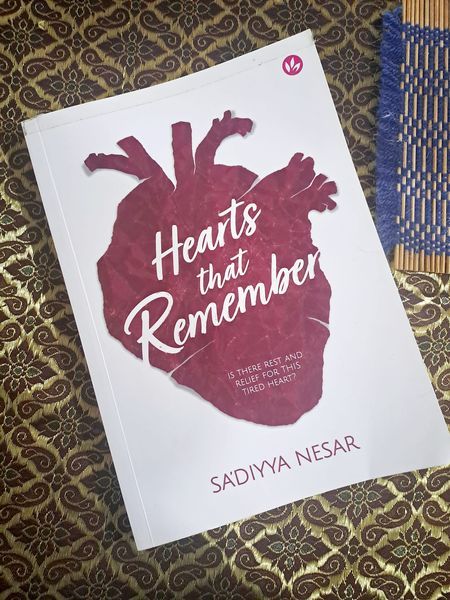
The content is well-divided into a few parts: Introduction - The Journey of Our Hearts, Part 1 - The Internal Battles of Our Hearts, Part 2 - Safeguarding Peace During Life’s Battles, and Conclusion, which the author discusses embracing imperfections and compassion to ourselves, and finally, bring attention again to us the important, the sweetness of remembering Allah swt in all our affairs.
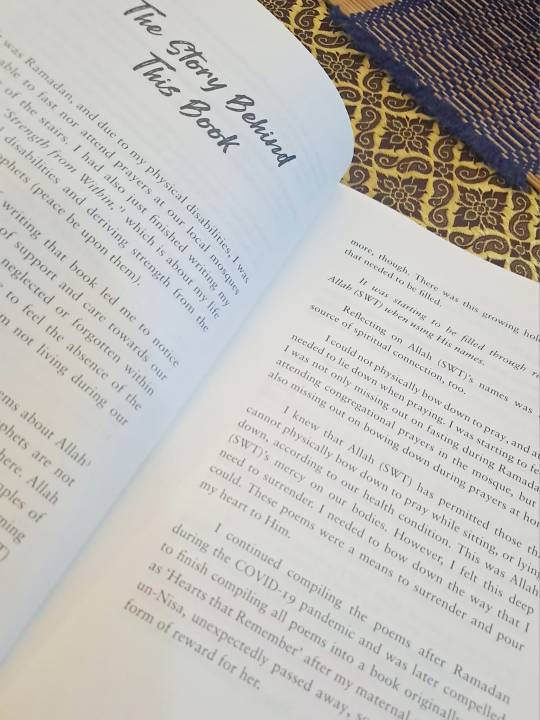

For quite some time now, I’ve been looking for books on Asmaul Husna that are neither too deep/technically nor too light/brief a.k.a, summary-ish. And, SubhanAllah, indeed if we keep seeking, He will show us the way.
Long story short, in my early 20s, I attended a “majlis tahlil”, and one of the “souvenirs” I received was a small booklet that contained selected asmaul husna, their meanings, their uses, which day and how many times they are recommended for our daily zikr. This most likely was a cultural thing and not entirely sunnah. The content interested me so well, that I started to leisurely read more on the 99 Names of Allah, and fell in love with making it a habit to do supplications by calling Ya Rabb with His specific names.
A few months back I “met” this book, I was mind-blown. Wallahi, I was so touched by this “revelation”. I think the author and her team, did a brilliant job! It’s amazing that she’s incorporating Asmaul Husna in her prose & poetry, Allahumma Bariki!
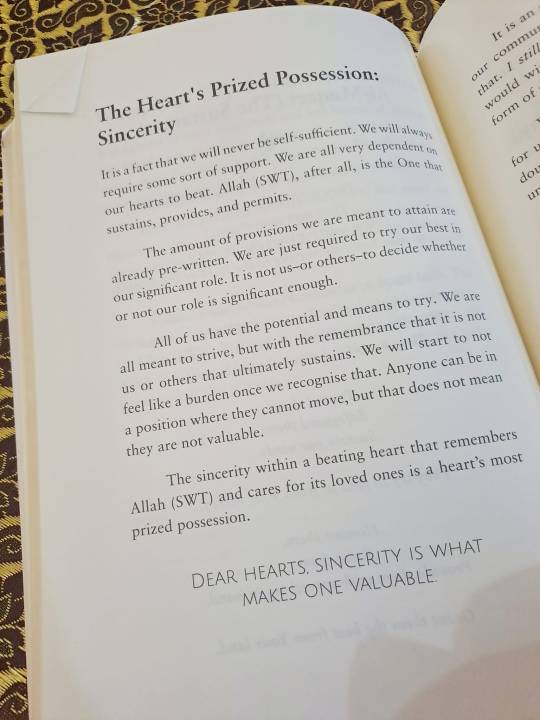
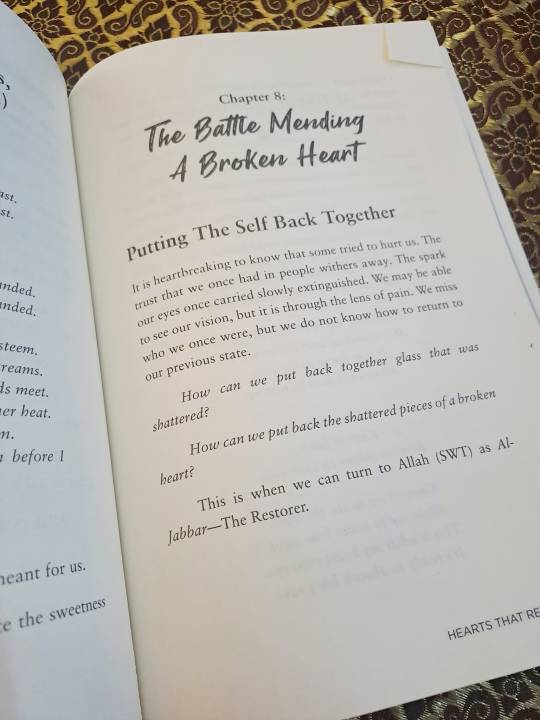
The author, sister Sa’diyya has her own “difficulties” that she deals with on a daily basis, and her remembrance of Allah SWT, keeps her moving forward. Throughout the book, she shares her life experiences and serves them as examples right before she complements them with beautiful, heartfelt, consoling, encouraging poetries; highlighting the grandeur, and the “functions” of Beautiful Names.


The book taught us to rely only on Allah, yet always appreciate and show gratitude to the good people surrounding us. The book also taught us it is human to feel down and helpless, but embrace yourself, care for yourself better, look for Allah’s signs internally and externally, and try your best to have faith. Find strength in the remembrance of Allah. I pray that this book may heal more troubled souls as much as it inspires deeper enlightenment in our fellow readers.

To provide some perspective about the poems, they are simple yet heartfelt, just like “Love&Misadventures by Lang Leav. The messages are as impactful as many pieces in “ The Thoughts of Nanushka by Nan Witcomb”.
The only downside of this book is probably just a matter of preference. To me, some parts of the life narrations can be a little bit draggy and not interesting enough. Otherwise, it is an almost perfect book(for an Islamic contemporary book)!
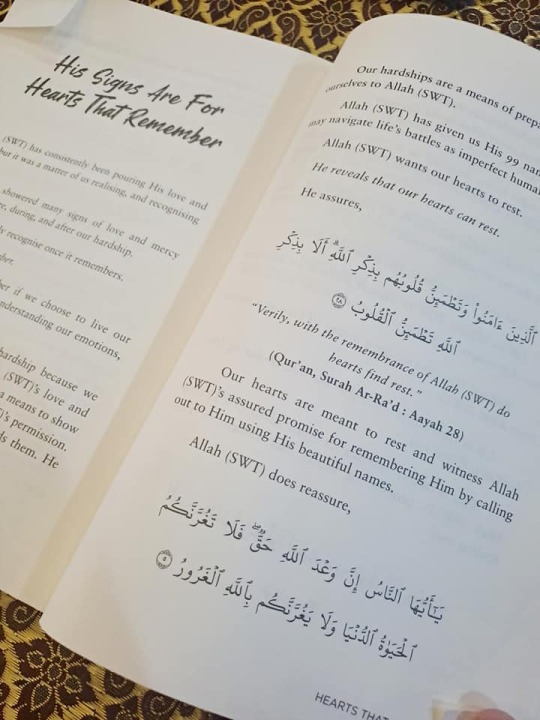
Highly recommended! <3 <3 <3
20:8
ٱللَّهُ لَآ إِلَـٰهَ إِلَّا هُوَ ۖ لَهُ ٱلْأَسْمَآءُ ٱلْحُسْنَىٰ ٨
Allah—there is no god ˹worthy of worship˺ except Him. He has the Most Beautiful Names.
— Dr. Mustafa Khattab, The Clear Quran
***
Get yours from Imanshoppe.com soon!
---
Find me on:
Instagram
Facebook
Goodreads.com
---
Join me on my Telegram Channel for quick updates and more!
#prose#poetry#contemporary#islamic books#nonfiction#hearts that remember#sa'diyyah nesar#iman publication#book review#ichamicha#recommended reading#Malaysia#bibliophile#asmaul husna
2 notes
·
View notes
Text
youtube

Aur rota hai raaton mein Pakistan kya waise jaise Hindustan
o Husna
Husna (Coke Studio) – Lyrics and Translation | Treasured Trifles and Trifled Treasures (wordpress.com)
0 notes
Text
tagged by @cordiformity (like two months ago sorry and thank u jess ❣️❣️) to post the top 5 songs from my on repeat playlist

can you tell it’s ramzan 😭
tagging @cairenes @taohun @iloveeverybodybecauseiloveyou @filmkamera @arthurianmotifs @terrorizzm @fennecshandgf @knivesgf @farhanqureshi @souvlakigf @raqhaelia hiiiii
8 notes
·
View notes
Text

7 notes
·
View notes
Text
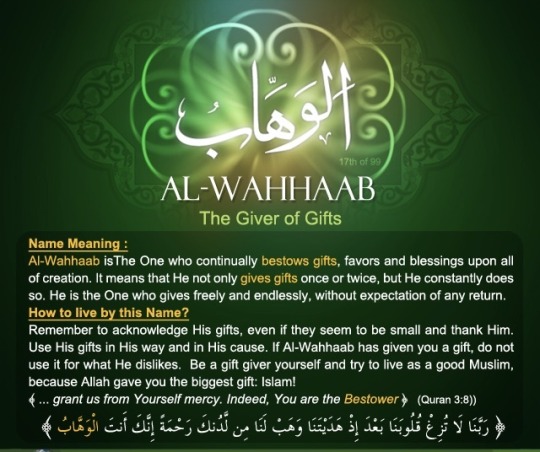
Allah calls Himself Al-Wahhaab— The Giver of gifts, The Most Liberal Bestower— three times in the Quran. He is the All-Giver who bestows gifts, favors, and blessings upon the whole creation. Al-Wahhaab gives gifts constantly, generously, endlessly, and without expecting anything in return!
The Great Giver, the One who constantly bestows
Wahhaab comes from the root waw-haa-baa, which points to three main meanings. The first meaning is to give for no compensation, to offer as a present, or to bestow and the second is to grant or endow. The third main meaning is to cause something to be.
This root appears 25 times in the Quran in two derived forms. Examples of these forms are: hab (“grant”) and yahabu (“he grants”).
Linguistically, wahhaab has the structure of intensification and is the intense form of Al-Wahib, the giver. The word hiba means gift. Al-Wahhaab is the source of all gifts, bestowing favors with the most detailed wisdom. His gifts come in the form of moments you experience, scenes you see, things you hear, and as material blessings.
Al-Wahhaab Himself says: Or do they have the depositories of the mercy of your Lord, the Exalted in Might, the Bestower? [Quran, 38:9] He said, My Lord, forgive me and grant me a kingdom such as will not belong to anyone after me. Indeed, You are the Bestower. [Quran, 38:35]
How can you recognize a gift?
Rizq (provision) is something that’s written for you, but you have to work for it; it depends in part on your efforts. A gift (hiba) isn’t something directly related to your efforts. A person you missed suddenly calling you or getting something just at the right moment are gifts. Sometimes you give gifts to someone you love and sometimes you give gifts to draw someone closer to you. What does it mean when Al-Wahhaab gives you a gift? It might mean that He gives you a gift so that you can come closer to Him, even though you were going astray.
How Can You Live by This Name?
1. Remember Al-Wahhaab.
When someone gives you a gift, you thank him or her. So what about the Giver of all gifts? The difference between a believer and disbeliever is that the latter lives with the gifts of Allah ‘azza wajal but doesn’t remember Him, while a true believer knows the giver through the gifts. Always be thankful to your maker for everything you get. If you contemplate the universe you get to know Allah; if you realize His gifts, your heart will melt out of love for Him.
2. Be a true giver.
Al-Ghazali said: Whoever bestows gifts with an eye to some interest to be realized by it sooner or later, either appreciation, affection or release from blame, or acquiring distinction of mention— he is neither a giver nor generous, but rather engaged in transaction and recompense . . . But the one who sacrifices all he owns, even his life, for the sake of Allah alone— such a one is worthy of being named giver and generous. Make your way of giving an act of ‘ibaadah (worship). How? Give gifts or favors for the sake of Allah ‘azza wa jall and not to get something in return.
3. Use the gifts of Al-Wahhaab in the right way.
Thank Al-Wahhaab by using His gifts to please Him. An example is the mobile phone; Al-Wahhaab gave you this technology, so use it for sharing knowledge and not for wasting time. If He gives you a nice afternoon with friends, don’t use it for backbiting or spending time in places of immoral behaviour.
4. Learn from the love of the companions.
Ja’far’s right hand, may Allah be pleased with him, was chopped off in battle, so he held the Islamic flag with his left hand. Another blow chopped off his left hand, so he held the flag up with his upper arms and held it there until he died. What love could drive him to sacrifice his life? Read about and learn from this and other great role models and sacrifice for Al-Wahhaab out of deep love.
5. Ask al-Wahhaab.
Amazingly, using this ism (name), there are more than one Quranic invocations; you will find the prophets, peace upon them, asking Al-Wahhaab for mercy, offspring, etcetera, ending with innaka anta al-Wahhaab– verily You are Al-Wahhaab. Look for these ayaat, memorize them, and use them in your daily life.
5. Don’t praise yourself.
Sometimes we say, I got married, worked hard, and got a beautiful house. Or we say, I gave my child a good upbringing, that’s why he is so good-mannered— I made my son like that! Don’t forget it was Al-Wahhaab who bestowed these favors on you. Your child is given to you as a gift from Al-Wahhaab. And We granted him (Abraham) Isaac and Jacob, each of whom did We guide; and before him, We did guide Noah, and among his progeny, David, Solomon, Job, Joseph, Moses and Aaron. Thus do We reward the good-doers. [Quran, 6:84]
6. Ponder what Al-Wahhaab has given you.
First of all, He gave you your existence. Then think of the greatest gift Al-Wahhaab gave you: guidance. Think about water, which is scentless and colourless. Imagine if water were sticky— how could you wash yourself? Look at your memory and how Allah gave foods a nice smell. All of these are gifts of Al-Wahhaab; ponder them.
7. Give gifts to others.
The Prophet salallahu ‘alayhi wa sallam said, Give gifts, for this will increase your mutual love [Muslim]. No human being gives anything for nothing, even if it’s that we give to gain the reward of Allah ‘azza wa jall by it. The only One Who gives asking for nothing in return is Al-Wahhaab. If a human being gives you a gift, It is Al-Wahhaab who inspired him to give you what he has given you! So first thank Allah ‘azza wa jall for inspiring people to help you, and then be grateful to the people by doing a favor for them, or, if you can’t, by saying jazakAllahu khayran or barakAllahu feek(i).
O Allah, Al-Wahhaab, we know You are the Giver of all gifts. Make us of those who are grateful for Your gifts and use them to please You, and adorn us with love for You. Make us ponder Your gifts, inspire us to give gifts to others, and give us from Your mercy that overwhelms us in this present world and the world to come. Verily, You are the best giver of gifts, ameen!
And Allah knows best.
#allah#islam#revert help team#asma al husna#revert help#muslim#ayat#daily#allah’s name#dua#pray#prayer#salah#muslimah#hijab#religion#reminder#mohammed#new revert#new convert#how to convert islam#converthelp#convert islam#become a muslim#welcome to islam#daily ayat#prophet#god#revert
27 notes
·
View notes
Text

husna doodle <3
9 notes
·
View notes